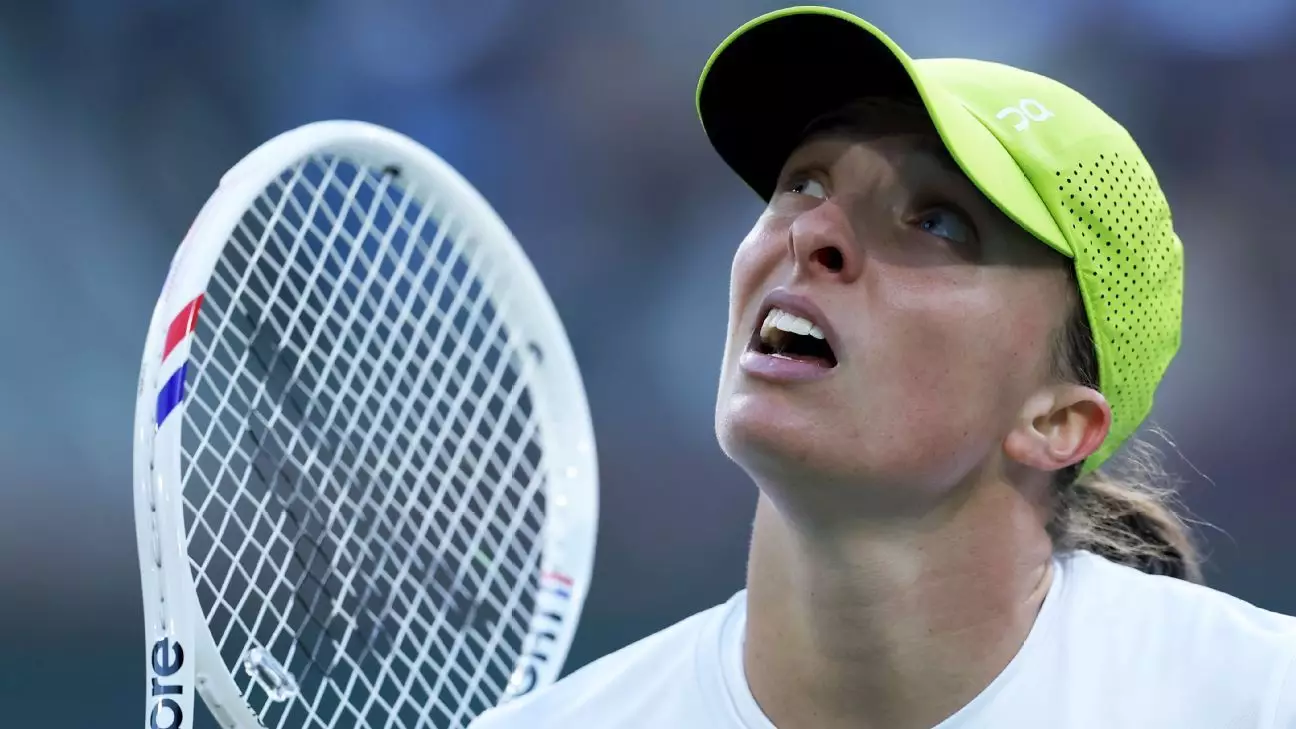In the realm of elite sports, the spotlight can be excruciatingly bright, particularly for athletes like Iga Swiatek, who have risen to prominence at such a young age. As a five-time Grand Slam champion, the 23-year-old Polish tennis star has not only succeeded on the court but has simultaneously endured an avalanche of public scrutiny. It’s a dichotomy that many aspiring athletes fail to comprehend—the celebration of victory often comes hand-in-hand with the weighty baggage of expectation and judgment. The pressures that mount from fans, critics, and social media can amplify the emotional rollercoaster that professional athletes experience. Swiatek recently opened up about this in a heartfelt social media post that peeled back the layers of what she has faced emotionally in recent months.
A Closer Look at the Challenges
Swiatek described a period of intense emotional upheaval—three weeks where tears defined her daily existence. This period was marred by not only external pressures but also internal conflicts. Reflecting on her experience following a doping suspension, Swiatek revealed the mental toll such situations can impose on an athlete. The stigma attached to doping accusations can be damaging and often unfounded, especially when one’s intention and integrity are called into question. She faced the daunting task of rebuilding herself amidst a courtroom of public opinion.
What stands out in Swiatek’s narrative is her struggle for authenticity in an environment that seems to demand perfection. She highlighted the challenges of being viewed through a binary lens: when she displayed stoicism on the court, she was often labeled as a “robot,” but when her emotions surfaced, she was branded “immature.” This inconsistency in public perception echoes a larger issue within sports culture—an inability to recognize athletes as humans with complex emotional landscapes. The emotional toll of this duality is evident in Swiatek’s candid acknowledgment that she felt her career was hanging by a thread, emphasizing the psychological fragility that often accompanies great success.
Understanding Public Criticism
One particularly revealing moment came during her semifinal loss at Indian Wells, where a seemingly innocuous act of frustration—hitting a ball in anger—became a catalyst for criticism. Instead of being understood as a moment of vulnerability, it was sensationalized, leading to harsh judgments regarding her character. This highlights a troubling trend where the lens of performance often overlooks the humanity of athletes. Swiatek’s experience serves as a reminder of the fine line athletes walk: they are performers, emotional beings, and role models all at once.
Her reflections on this incident challenge fans to reassess their reactions and judgments, perhaps calling for empathy rather than criticism. The pressure to conform to public expectations can lead to unreasonably high standards for emotional expression, an expectation that can warp how both athletes and fans interact with one another. Swiatek’s self-awareness allows her to critique not only her behavior but also the culture that fosters an environment of harsh judgment.
The Burden of Mental Health
Swiatek’s narrative brings to light a vital conversation about mental health in sports, a topic that has gained traction but still lacks comprehensive understanding in certain circles. The acknowledgment of her struggles is a powerful reminder that mental health issues can affect anyone—regardless of status or fame. Her candidness paints a picture of an athlete who is not only grappling with the burdens of competition but also the insidious nature of mental health challenges exacerbated by public perception.
As someone who has dominated the WTA rankings, the expectation for her to maintain that position can be overwhelming. When combined with personal setbacks, such as her explained doping situation, it becomes clear how the burden can weigh heavily on even the most accomplished athletes. Swiatek’s struggles resonate with anyone who has faced judgment in their professions and shines a light on the often-ignored complexities that define an athlete’s existence beyond victories and ranks.
Courage to Share Vulnerability
In sharing her emotional journey, Swiatek is not just addressing her critics; she is also fostering a much-needed dialogue about vulnerability and authenticity in sports. Her call for understanding is a challenge to fans and other athletes alike to embrace imperfections and to allow space for emotional expression. As she continues her journey, one can only hope that her courage in speaking out helps cultivate a more compassionate environment in the world of sports—one where athletes can express their humanity without fear of unjust judgment.
Swiatek’s narrative serves as a crucial reminder that while champions are often admired for their physical prowess, it is equally important to recognize the emotional challenges that accompany their victories. The road to mental fortitude is paved not only by victories but also by the strength to confront and share vulnerabilities. Thus, she not only captures the essence of sportsmanship but also the heart of what it means to be truly human in the face of relentless scrutiny.

